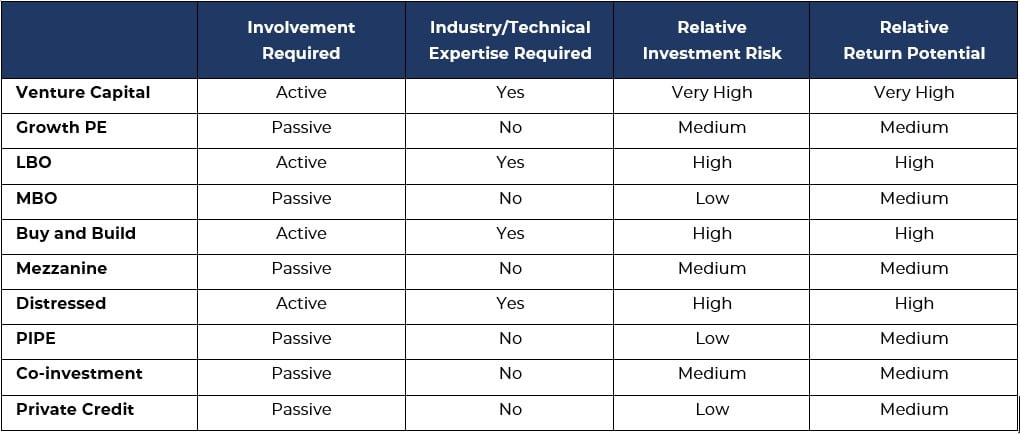Family offices should consider private equity investments for reasons such as diversification, potential for higher returns, long-term investment horizon, customization and control, access to unique investment opportunities, and wealth preservation. However, it is important to carefully consider risks and internal capabilities before any investment decisions. As such, selecting the most suitable Private Equity investment strategy is the most critical step in the investment process. In this post, we discuss the various Private Equity investment strategies with some examples.
1- Growth Equity
This is a Private Equity investment strategy, also sometimes called “expansion capital”, centered on investing in established businesses that have reached a certain level of revenue and profitability and are looking for funds to support expansion, product development, or strategic initiatives. This strategy may also be used for companies in the growth stage. Since the business is already established and has a management that has identified growth projects, the investor is not required to be involved in the operations of the business. The risk is lower as compared to the venture capital investment strategy and consequently upside is also shared between the existing shareholders and new investors.
In 2013, Uber raised $258 million in a growth equity investment round led by Google Ventures and TPG Capital. The investment helped fuel Uber’s rapid expansion and solidify its position as a leader in the ride-sharing industry. Another example is Airbnb, when in 2014, it raised $475 million in a growth equity investment round led by TPG Capital and Sequoia Capital.
2- Buyouts
The buyout is a Private Equity investment strategy in which the Private Equity fund acquires a majority stake in the investment. Buy-out strategy can be further divided into three categories: Leveraged Buyouts, Management Buyouts, and Buy & Build strategies.
2.1 Leveraged Buyouts (LBOs)
To buy mature businesses with steady cashflows, Private Equity funds often go for the strategy known as an LBO. LBOs use a combination of equity financing and debt financing to acquire a company. LBO strategy is very similar to purchasing a house using a mortgage. Since the Private Equity investors have a controlling stake in the company, they actively take part in its management.
LBOs can provide investors with great profits, but they are also considered high-risk investments because of the substantial amount of debt needed to finance the purchase. If the company fails to perform as projected or does not generate enough cash flow to satisfy its debt obligations, the Private Equity firm may be obliged to restructure or sell the company at a loss.
One of the most famous examples of an LBO is that of RJR Nabisco. Kohlberg Kravis Roberts (KKR) conducted a landmark $25 billion leveraged buyout (LBO) of RJR Nabisco, a food and tobacco business, in 1989. The LBO was the subject of a best-selling book and a film, and it is regarded as a pivotal moment in the history of private equity.
2.2 Management Buyout (MBO)
A management buyout is another variant of LBO, whereby instead of a private equity firm, it is the management team who buys a company from its current owners or shareholders. The funds to carry out an MBO are usually arranged through personal investments, bank loans, or even Private Equity firms. The management team in MBO is already familiar with the company’s operations and may have a better long-term vision for the company’s growth and success.
The privatization of Dell in 2013 was a management buyout (MBO) strategy. Michael Dell, the company’s founder, chairman, and CEO took the company private in collaboration with Silver Lake, a private equity firm focused on technology.
2.3 Buy & Build
The Buy & Build strategy is a type of buyout whereby Private Equity funds acquire a platform company that has a strong market position and expertise under its umbrella. The platform company is used as a base or a foundation to further build on through the acquisitions of more businesses. Buy and build allows companies to grow at a much faster pace. It also generates higher returns for investors.
To succeed, a buy-and-build strategy must be carried out with precision. The Private Firms acquiring the platform company must ensure that it has a great deal of expertise in the industry/sector they are investing in.
In 2018, the private equity firm, KKR, expanded its cybersecurity company through Optiv, which had already generated $2.25 billion in sales, using a buy-and-build approach. Optiv had engaged a European general manager with acquisition experience and was looking to acquire independent security businesses in Europe and the United Kingdom.
3- Venture Capital
Venture Capital is a type of Private Equity investment strategy that focuses on early-stage startups and new businesses. These companies may not be profitable, hence the main purpose of such an investment is to generate extraordinary returns considering the risks. Venture Capital funds, unlike leveraged buyouts, generally take a minority share. This places the company’s management in charge of the business. Many early-stage firms fail to reach the growth and profitability required to earn returns for investors, hence venture capital investments are high-risk, high-reward investments. Successful venture capital investments, on the other hand, may generate significant returns.
Examples of successful venture capital investments include Sequoia Capital’s investment in Google in 1999 or its investment of $60 million in WhatsApp. Another example is Andreessen Horowitz’s investment in Facebook in 2009.
4- Mezzanine funds
Mezzanine debt is a type of financing that incorporates elements of both loan and equity, and it is frequently used in private equity transactions to provide funding for special projects. Mezzanine debt is often unsecured, subordinated debt that ranks below senior secured debt but above equity in the capital structure. It often has a higher interest/coupon rate than traditional senior debt, but it also provides more repayment flexibility and can include equity-like characteristics such as warrants or equity kickers. For many private equity firms, it is the best of both worlds. It provides a higher return than debt financing and lower risk than equity financing.
In 2018, private equity firm Ardian provided mezzanine debt financing to Suez, a French waste management company. The financing was used to support the company’s acquisition of GE Water and Process Technologies, a US-based water treatment company.
5- Distressed Private Equity
One strategy used within the sphere of private equity is distressed debt, also sometimes referred to as “special situations”. Private equity firms invest in companies that are distressed financially, facing bankruptcy, or any operational challenges. The main benefit to private equity firms is the lower purchase price. Distressed private equity investors work with the company’s management to improve its operations, restructure its finances, and eventually raise the firm’s value.
Ultimately, distressed private equity may be a very risky but highly rewarding investing approach. Before undertaking such a strategy, investors should carefully analyze the risks and possible returns, as well as ensure that they have the required skills and resources to execute a successful turnaround.
In 2018, private equity firms Bain Capital and KKR & Co. spearheaded a $3.1 billion takeover of the toy retailer Toys “R” Us, which had declared bankruptcy the previous year. They intended to turn around the faltering company and revitalize the brand.
6- Private Investment in Public Equity (PIPE)
PIPE simply refers to investment in publicly traded companies by private equity firms by purchasing newly issued shares at a discounted price. This transaction can take two forms, traditional PIPE and structured PIPE. In a traditional PIPE transaction, the private equity firm typically purchases common or preferred stock. In a structured PIPE transaction, complex financial instruments such as convertible preferred stock are issued. PIPEs save companies time and money while raising funds since they have less rigid regulatory requirements than public offerings.
In 2021, Softbank made a $1.5 billion investment via a PIPE in a SPAC deal between digital lender Better.com and Aurora Acquisition Corp.
7- Co-investment
In the world of Private Equity, co-investment refers to an investment strategy in which the co-investors invest in a company with a Private Equity fund that manages the investment and makes management decisions. Usually, co-investors have a minority stake in the investment as opposed to the Private Equity fund that owns a controlling stake.
For co-investors, this strategy allows them to invest in transactions that would otherwise be difficult to access as an individual. Moreover, the returns can be higher due to the lower management fees. However, co-investing as a process can be complex in nature due to many legal considerations.
In 2018, Alibaba Group announced a $2 billion co-investment deal with French retailer Auchan Retail and Taiwan-based conglomerate Ruentex Group to expand their partnership in China.
8- Private Credit/Debt
Private Equity firms also lend to smaller, medium-sized companies that are not publicly traded or of investment grade. Private Debt is commonly employed to fund leveraged buyouts, acquisitions, recapitalizations, and other forms of corporate transactions. Senior debt, mezzanine debt, and unitranche debt are all examples of private credit.
Some of the largest private debt funds include Ares Capital Europe VI ($11.2 bn), Blackstone Green Private Credit Fund III ($7 bn), Oaktree lending Partners ($10 bn) and so on.
Comparison of Various Private Equity Investment Strategies

Conclusion
It is important to note that private equity investments also come with risks, including illiquidity, volatility, and potential loss of capital. Family offices should carefully consider their investment goals, risk tolerance, and seek professional advice before making any investment decisions, including private equity investments.
If you are a family office investment manager interested in private equity investments, we invite you to visit our website and schedule a discussion. Our team of experts specialize in assisting investment managers to select the right investment strategy that aligns with your internal capabilities and goals.

